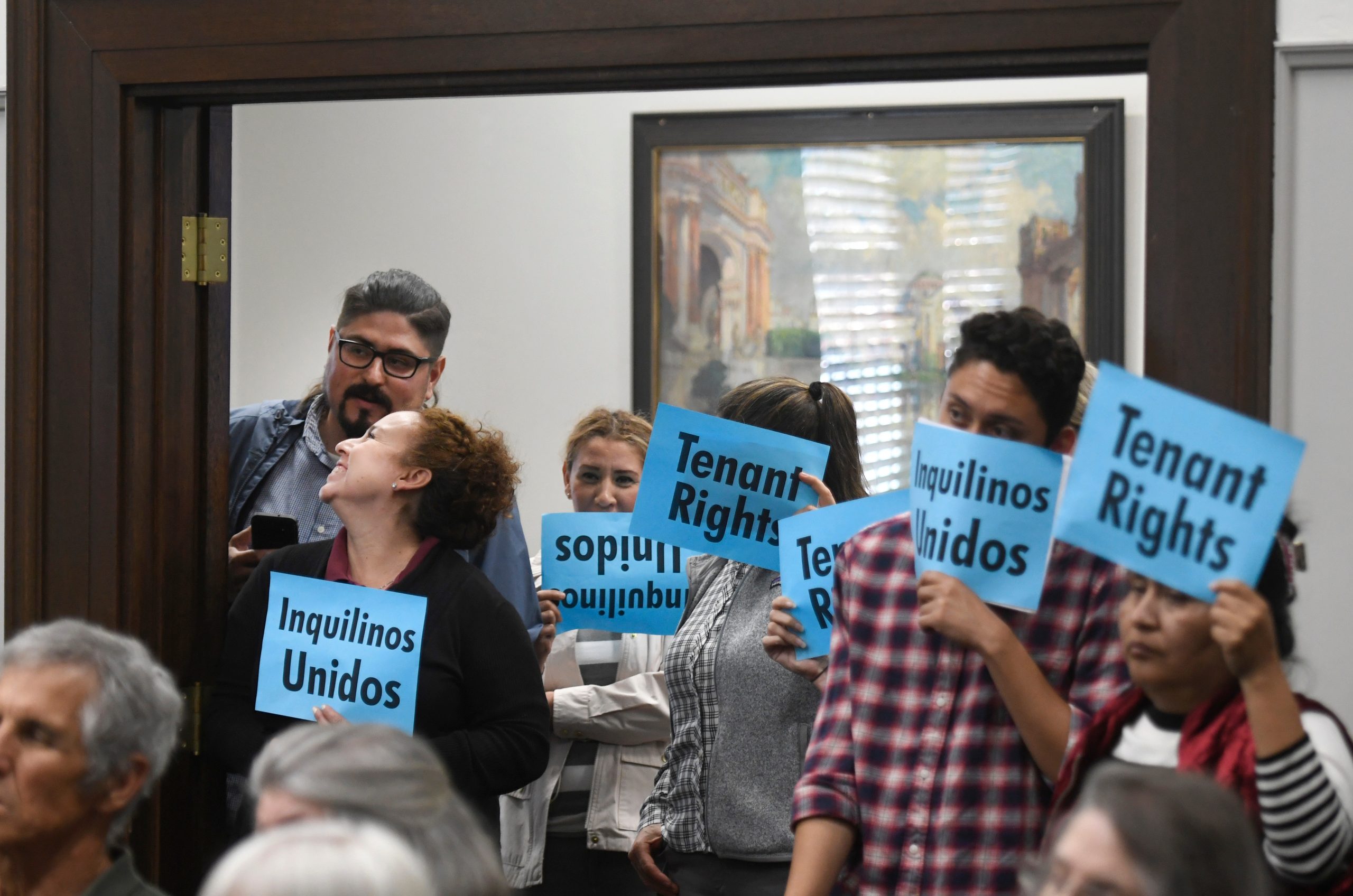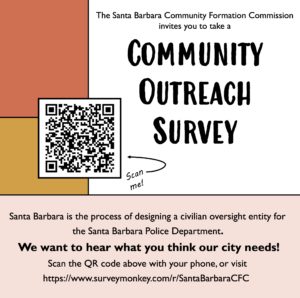By Richard Appelbaum and Wayne Mellinger
Mission Statement of CLUE’s Housing Justice Workgroup: We advocate for affordable, community controlled housing, the protection of renters and mortgage-holders from displacement and unfair eviction and support efforts at rent stabilization.
Motivated by the severity of our housing crisis, CLUE’s Housing Justice Workgroup is rethinking our goals and strategies as advocates and the crucial role local faith communities play in bringing changes to the housing system of Santa Barbara County.
Our local housing system is so dysfunctional, in part, because it is overly focused on the interests of the most wealthy in our community, as well as corporations. With a housing market so attuned to the needs of movie stars, moguls and mega corporations we have forgotten the needs of working families, who often pay over 50% of their income on housing.
We need your help to re-focus our housing system on the needs and well-being of ordinary working families and communities. When faith communities show up to advocate for affordable housing or tenant’s rights we’ve seen how politicians pay close attention and even change their minds.
We believe that housing is a human right and have a vision of a society where all people at all income levels have stable, safe, high-quality and affordable housing. That is housing justice.
THE HOUSING CRISIS
Everybody knows that California has a “housing crisis”. The phrase is readily tossed around yet rarely explored. In fact, California has three distinct “housing crises”, which while stemming from the same underlying problems, impact different segments of the population.
The first and most important housing crisis in California is the 150,000 people who are unhoused. Not too long ago a UN official on a walking tour of homeless encampments in Oakland and San Francisco called the living conditions she witnessed “cruel and inhuman”. This shameful situation reveals just how bad things have gotten.
Locally, there are about one thousand unhoused people in the city of Santa Barbara and about two thousand in our County. While a lot of progress is being made, with, for example, “tiny homes” being used to house 33 people last month, and with several affordable housing developments either planned or under construction, the number of people falling into first time homelessness is still very high, leading to the perception that nothing has changed.
The second housing crisis is the 7 million Californians living in poverty who pay more than 50% of their income on housing. While not homeless they are often potentially a couple paychecks away from homelessness. Disproportionally affecting immigrant and communities of color, these renters face intense displacement and gentrification pressures, often living in overcrowded and unsafe housing conditions. Recently rents have skyrocketed in Santa Barbara with the average rent for an apartment over $2400 / month, a price those working in our hotels, restaurants or agricultural fields cannot afford.
The third housing crisis affects a younger generation of middle-class Californians who wonder if they will ever be able to afford a home. This year the average home price in Santa Barbara reached $2.2 million, significantly up from one year ago. The solidly middle class educated professionals that keep our city working cannot afford to live here as we become the home to movie stars and moguls.
HOW CLUE IS RESPONDING TO OUR HOUSING CRISIS
To address these issues the CLUE Housing Justice Workgroup is immersed in the many dialogues taking place about the future of housing in Santa Barbara. Of course, the meetings of the Santa Barbara City Council and County Board of Supervisors are crucial for understanding our government’s response to the crises and the perspectives of our elected leaders.
CLUE often partners on housing concerns with several other well-respected local organizations, including the League of Women Voters, SBCAN and CAUSE—three progressive powerhouses in local political campaigns.
CLUE’s Housing Justice Workgroup develops and maintains collaborative relationships with faith communities, faith leaders, and interfaith and inter-religious organizations throughout the Santa Barbara area. The goal of the Workgroup is to advance housing justice through the engagement of faith leaders, communities, and organizations in policy advocacy campaigns and participation in the movement for housing justice.
As part of CLUE’s Housing Justice Workgroup, members work to educate, empower, and organize people of faith to take action to preserve, protect, and create affordable housing. Additionally, members seek to acknowledge and bring to light the intersectionality of the movement for housing justice and the shared struggles of workers, immigrants, people with disabilities and members of all marginalized and/or disenfranchised communities against systemic violence, and racial and economic injustice.
The CLUE Housing Justice Workgroup plans a two year campaign in which we hope (1) to stabilize the rising costs of rental housing in Santa Barbara; (2) address the acute shortage of affordable housing in our community; (3) support renters and mortgage holders from unfair evictions and displacement; (4) support tenants and their rights, stopping unfair evictions.
RECENT EVENTS
Several of us are part of the Santa Barbara Housing Justice Coalition, which also includes representatives from SBCAN, CAUSE, the Democratic Party, League of Women Voters, Central Coast Labor Council, labor unions, Sen. Limon District representative, and a few academics (Rich is one). This Coalition takes a strategic view of these issues and has met several times on Zoom to discuss these issues. Rental stabilization currently tops on the housing justice agenda in our community.
As UCSB Professors Alice O’Connor and Richard Appelbaum argued in a June 29, 2022 article in the Independent, rent stabilization is a necessary tool, since the market cannot provide affordable housing in Santa Barbara. As they pointed out in the article, “the median home sale price in the City of Santa Barbara rose an astonishing 30 percent in 2020-21 and an additional 34 percent in 2021-22 to reach $2.2 million. Already sky-high rents continued to rise, reaching an average of $2,400 per month, far outpacing household incomes.” While there are many causes of homelessness, the lack of affordable rental housing is a central driver.
In April a divided Santa Barbara City Council, faced with a proposal for a 2 percent rent cap that had widespread public support, did the predictable: it created a Housing Crisis Task Force to study the issue. The Task Force is chaired by Councilmember Oscar Gutierrez and includes councilmembers Alejandra Gutierrez and Kristen Sneddon; Housing and Human Services Manager Laura Dubbels; and Community Development Director Elias Isaacson. Currently the City Council is divided 3-3 on the issue, with one member undecided.
The Housing Crisis Task Force plans to move slowly; according to Gutierrez a City Council decision is not expected until next summer. Speaking personally, we would hope data could be collected (and a convincing argument made) long before that time. To move things along, CAUSE has organized after work public meetings on the topic, both to get input from the community and to educate those in attendance about rent stabilization. Meetings so far – which are conducted in both English and Spanish – have enabled Councilmembers Oscar Gutierrez and Kristen Sneddon to hear community concerns.
A key issue diving the City Council is whether rent stabilization will hurt small (“mom and pop) landlords, or if it can be targeted against corporate landlords, many of whom hide behind Limited Liability Corporations (LLCs). To address that issue, two CLUE board members (Frank Rodriguez and Richard Appelbaum) are exploring a partnership with UCSB’s Spatial Pattern Analysis & Research (SPAR) Lab that will enable us to penetrate the ownership of LLCs, analyzing and mapping rental property ownership, gentrification, and demographic changes in Santa Barbara. Many other tasks remain, including eventually creating a rental registry and drafting a model ordinance. Fortunately, there are many cities throughout California that have some form of rent stabilization from which we can draw.
In the long term, the Housing Justice Coalition, in partnership with other organizations, hopes to address the issue of overall housing shortages by raising funds to build more housing. Various approaches are under discussion, all of which echo Wayne Mellinger’s proposals for a “A Marshall Plan to Build Affordable Housing”, which appeared in Noozhawk on March 23. All would involve raising substantial sums for affordable housing. Possibilities include an increase in the bed tax, a tax on vacant homes, and a deed transfer tax on high-end real estate transactions. All of these are currently under consideration – or even being tried – elsewhere in California. All are obviously politically fraught. Any such large-scale solution would most likely require a ballot measure – or possibly many ballot measures, one for each city in Santa Barbara County, and one for the County itself.
CLUE should play a leading role in these efforts, beginning with the rent stabilization proposals now under discussion, as well as the large-scale approaches to building more housing. CLUE’s Housing Justice Workgroup plans to make presentations to faith organizations, both to educate around these issues, and hopefully to solicit volunteers for the campaigns that will likely be needed to achieve success.
We will have our work cut out for us.



